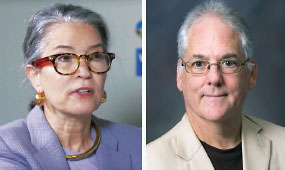Climate Impact on Psychiatric Diagnostic Nomenclature

We must address the diagnostic nomenclature for psychological impacts on individuals affected by the climate crisis. As the impacts of the climate disruption become more apparent and the physical and emotional effects more damaging and pervasive, we need to use standardized terms to describe the associated conditions and disorders.
Global warming is increasing the frequency and intensity of extreme weather events, including wildfires, floods, hurricanes, heat waves, and droughts. It is also causing and accelerating chronic environmental changes, including sea level rise, desertification, ocean acidification, and the decline of biodiversity and is linked to decreasing male fertility. Our health, quality of life, and survival are in jeopardy.
The impacts of the climate crisis are both physical, including injuries, illness, and loss of life; and psychological, with trauma, personal losses, and profound fears of future harm. Psychosocial impacts accrue from the effects of displacement, the disruptions to everyday life, and growing cynicism that institutions, including government, cannot be relied upon to take effective action.
Studies have found increased risks of violence and suicide associated with heat waves, increased psychiatric illness and cognitive impairment from air pollution, social and psychological impacts of mass migration from climate disruption as a root cause and threat multiplier, and anxiety syndromes associated with the sense of foreboding and feelings of powerlessness that many report as they witness or anticipate rapid and extreme changes in the geophysical environment.
As mental health professionals, we have benefited from having a standardized diagnostic nomenclature. DSM provides a convenient and valuable means to facilitate clinical communication that assures we are “talking about the same thing” as we guide and evaluate treatment for our patients. Does DSM adequately accommodate or account for climate disruption associated impacts on psychiatric disorders? We suggest that the risks and specifiers associated with the relevant psychiatric conditions that are exacerbated or caused by climate associated environmental factors must be more actively considered, documented, and tracked for effective patient care, both in terms of prevention and appropriate treatment.
For any condition associated with or derived from climate disruption that rises to the level of being a psychiatric disorder, the climate factors should be identified as primary drivers or precipitants of the disorder. The need to acknowledge the growing public health risks of climate disruption obliges us to expand our lexicon in this way.
We propose that users of DSM be encouraged to vigilantly and more clearly describe what is happening to many victims of climate disruption. Two prototypical examples would be generalized anxiety disorder with climate disruption–associated factors and specific phobia, environmental type with climate disruption factors.
Emerging Syndromes?
We have observed increased reports of at least two conditions or syndromes that appear to be derived, at least in part, by current and impending impacts of the climate crisis: pre-traumatic stress disorder and ecological grief. Evidence of increasing awareness of and worry about the reality of climate change and forecasts of increasing environmental degradation is associated with increasing numbers of individuals who exhibit anticipatory anxiety and trauma symptoms. Pretraumatic stress disorder would appear to be similar to posttraumatic stress disorder, albeit with a difference in the temporality of precipitating factors. Ecological grief is often described in particular relationship to indigenous and first-nations populations who depend on the land and sea for much of their food, other essential resources, and cultural identification. More detailed descriptions of these conditions will be provided in future columns.
Climate Stress Is Not Necessarily Pathological
What if anticipatory fears, whether they be dysfunctional or not, are based in reality and indicate catastrophic risks of harm to humanity and civilization? Although we have been discussing psychiatric disorders that are stimulated or affected by climate change, there is a fine line between symptoms that contribute to maladaptive personal distress and dysfunction and those that are grounded in the actual conditions of one’s existence without resulting in any disability. We must be cautious about what we label as pathology and apply our therapeutic skills to support and comfort those who are suffering for understandable and justifiable reasons.
Those who work on the forefront of climate science, disaster response, climate impact mitigation, and climate activism—so-called climate first responders—are experiencing a great deal of stress, including symptoms of anxiety and burnout. They attribute this to a combination of factors, not least of which is the notion that “once you know” the reality and projected trends of the climate crisis, you cannot easily erase its implications from your mind and way of being. Another factor is the despair over the lack of meaningful public response or policy actions to address these trends. Add to these concerns the denial, disdain, and overt repudiation of their commitment to the salvation of Earth and its inhabitants by those whose denial derives from ignorance, conscious or unconscious commitment to short-term profits and/or enjoyment, and the cumulative distress that climate first responders experience is easier to understand.
Seen from this perspective, we should pause and reflect on whether the failure of the greater majority of humanity to recognize the dangers we face is, in itself, pathological. Such denial represents a greater risk of harm and mortality to self and others. In the meantime, we need to be more mindful of these stressors and recognize the potential therapeutic benefits of naming and classifying them with a standardized nomenclature, as well as the urgent need for individual and collective actions to address the ultimate social determinant of health that the climate crisis represents. ■



